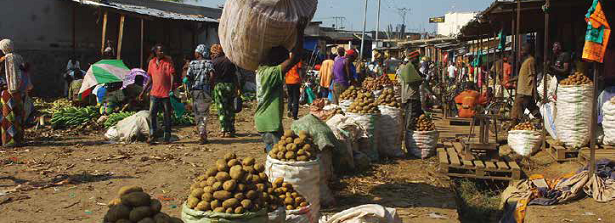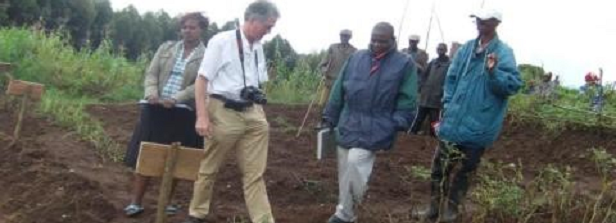More potatoes – Secure food in Burundi

Duration: July 2014 – July 2017. This project has been finalized.
Project information
Aim: Research, development and knowledge transfer involving growers on special care to make sure planted ‘seed’ potato tubers are well sprouted and avoid diseases.
Objective: Contribution to food and income generation for small-scale holding families.
Method: Develop and promote processing technologies and innovations that contribute to the food security and related business needs within the framework of the MASP of the Dutch embassy. Recommendations towards appropriate application of seed potato regulations will be developed.
Country: Burundi.
Dutch policy goals: Increased sustainable agricultural production; More efficient markets; and A better business climate.
Progress reports
Year 1: In Burundi, potato is the most important food and income generation where it is grown. However, unavailability and limited access to improved seeds and poor methods constrain value addition of the crop. In order contributing to resolve this constraint, Burundi potato consortium (CAPAD, ISABU, ITEC and WUR) submitted the project to WOTRO; and that project called “DEVELOPMENT OF POTATO SEED QUALITY BASED INNOVATIONS FOR SMALL SCALE FARMERS IN THE THREE PROVINCES A ROUND BUJUMBURA TOWN IN BURUNDI” have been approved and funded. Main approval documents of the project were made by the project itself, award letter, project notification, consortium agreement, start letter. Project objective is availability of quality seed potato for increased food security and income generation in small-scale holding families. Expected outcomes of the project are (1) develop, validate and promote gender responsive potato technologies and innovations, (2) enhanced capacity of value chain actors to produce, market and utilize quality seed, ware and processed potato, (3) enhanced adoption of policies, standards and regulations for improved quality seed potato value chain performance in Burundi. As specified in the title, the implementation of the project is conducting in the three provinces around Bujumbura town especially in Bujumbura, Bubanza and Cibitoke Provinces. In the first phase (year 1), communes concerned are Mugongomanga, Musigati and Bukinanyana which are in high altitude areas. However, it is expected demonstration fields at low altitude and the communes concerned are Bubanza and Isale.
Year 2: To improve the potato production in Burundi, the team first conducted 15 field trials together with 15 pilot farmers in three provinces: Chibitoke, Bubanza and Bujumbura. Different treatments of the potato seed were arranged in a randomized complete block design (RCBD) with five replications on each location. Results included that harvesting at an early or late stage doesn’t influence tubers formation, that treatment with chemicals increases the yield and that the new fertilization techniques from the Institut des Sciences Agronomiques du Burudundi (ISABU) significantly increase the number of tubers and reduce bacterial wilt disease.
Farmer field schools
Thereafter, the team organized farmer field schools to demonstrate that farmers can improve yield and quality with modern varieties, chemical control and the fertilization techniques of ISABU. The invited producers were members and non-members of three farmer cooperatives. Within each cooperative, 5 demonstration experiments were conducted. Also seed potato multiplication technologies were tested at farm level.
Seed business
To make the potato seed business more sustainable, the team developed a plan based on an analysis of the opportunities and threat in this business. Different strategies were implemented to improve the diffusion of clean seed to small private multipliers and ware potato growers. The team supported community-based quality standards, labeling of tested varieties and training of inspectors. The researchers also improved an easy-to-use low-cost diseases detection method and they supported plant health inspector services. Moreover, they provided training to seed growers, extensionists, traders, processors, certification agents and basic seed producers. In order to stimulate conformity to standards and practices in the potato products’ marketing, the team conducted a market analysis and developed protocols and regulations for improved quality of seed potato in Burundi.
Final report
Summary of the results: Potato is one of the most important food and income generation crop in Burundi. However, limited access to improved seeds and poor production techniques constrain its value addition. On-farm research were carried out to improve the low potato (Solanum tuberosum) yields. Technologies related to improved varieties, healthier seed tubers, and affordable seed environment were evaluated as main factors improving yields and quality of potato produce. Marginal rate of return of investments were calculated at farm level comparing current and alternative technologies. An improved variety contributed up to 20 % yield increase, healthier seed (80 %). Diffused light storage, alternating contact and systemic fungicides applications and application of chemical fertilisers resulted in a 30%, 50% and 60% yield increase, respectively. It was shown that it is possible to double yields both physically and economically (Marginal Rate of Return-MRR of 202%, 230%, 162%, 230% and 185%) under growing conditions in Burundi when planted respectively a new variety, healthy pre-sprouted seed, apply chemical fertilizers and fungicides. These results led to a strong linkage between producers and consumers and made impact in the household such as paying school fees, improving traditional roofing and selling formal seeds which make their produce valuable.

